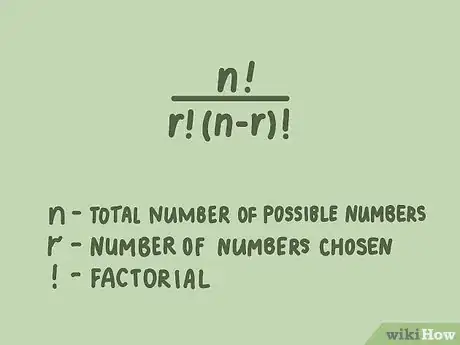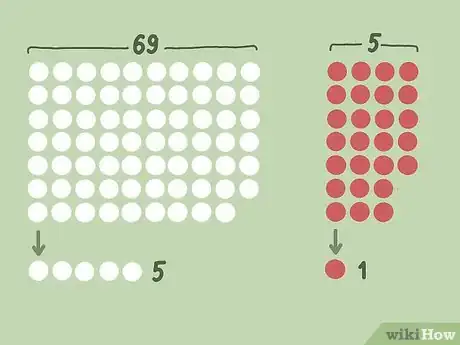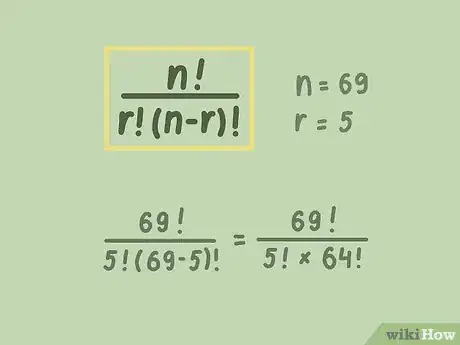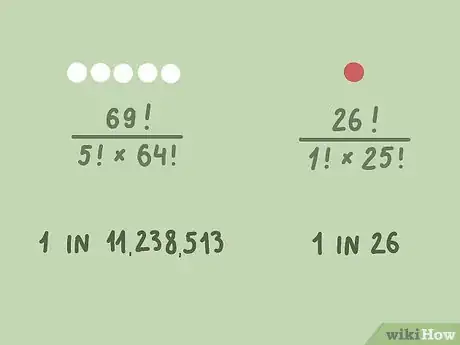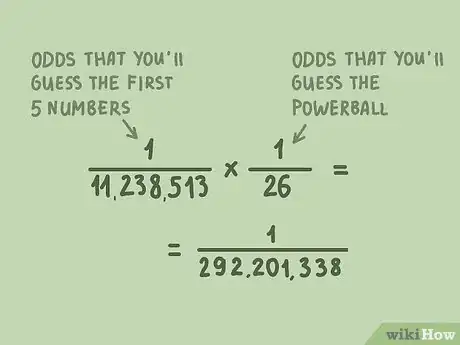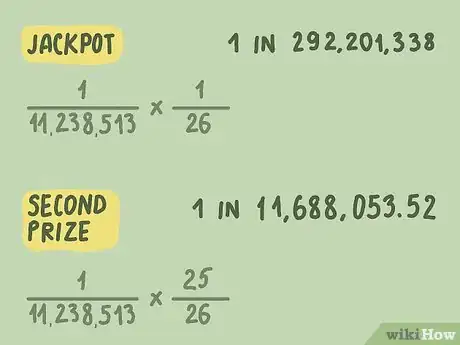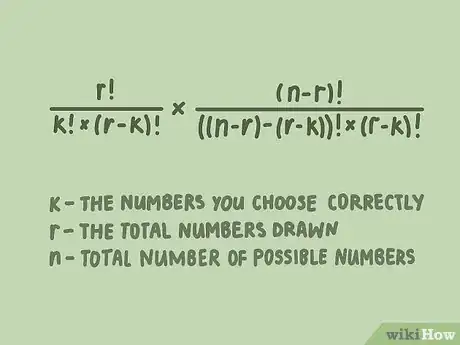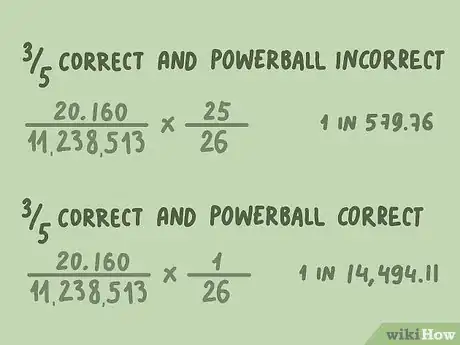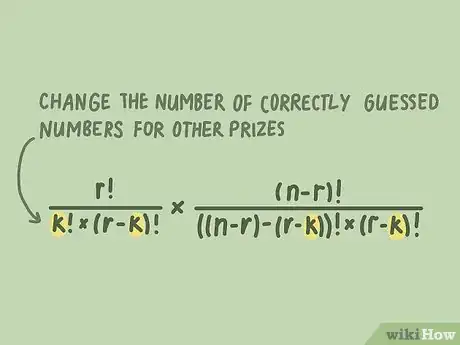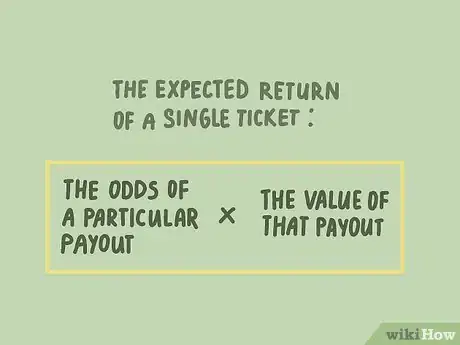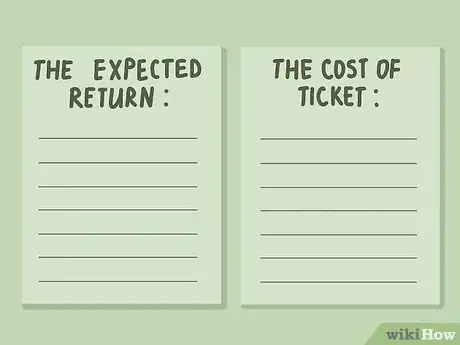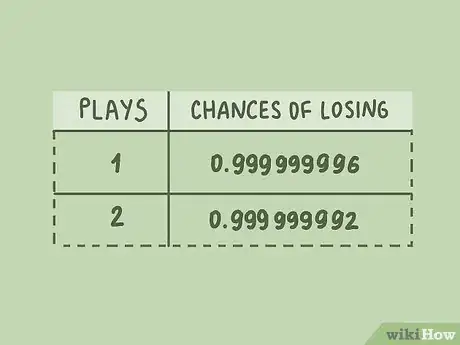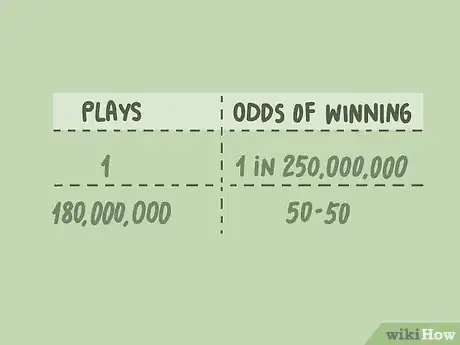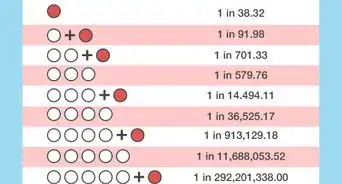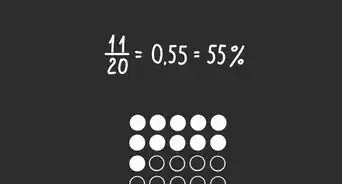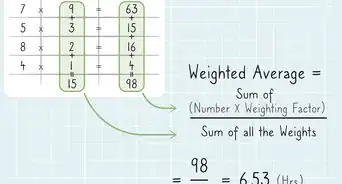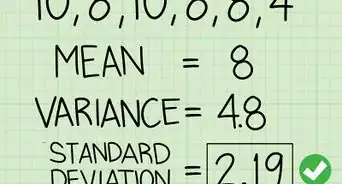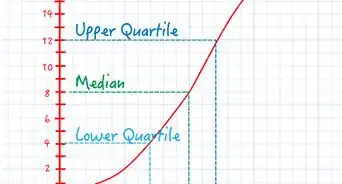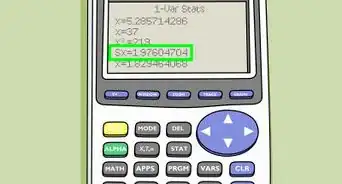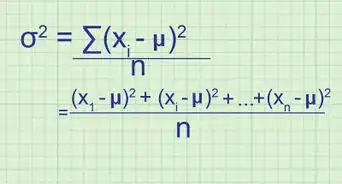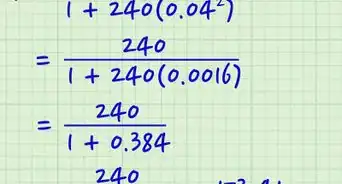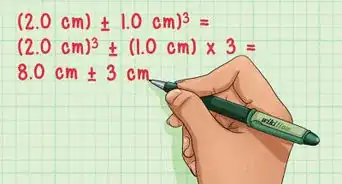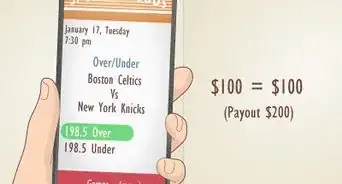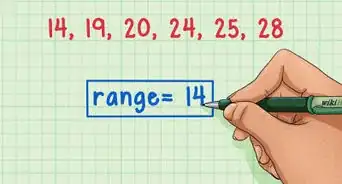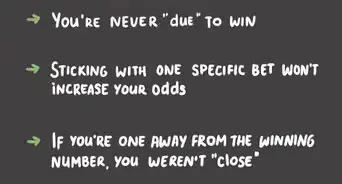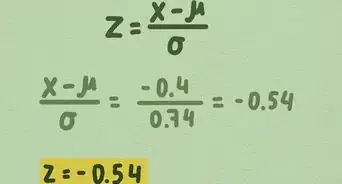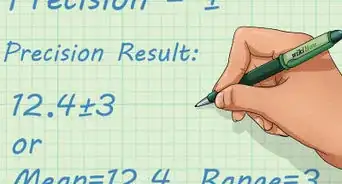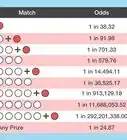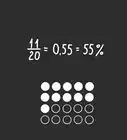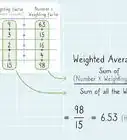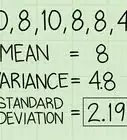This article was co-authored by David Jia and by wikiHow staff writer, Jennifer Mueller, JD. David Jia is an Academic Tutor and the Founder of LA Math Tutoring, a private tutoring company based in Los Angeles, California. With over 10 years of teaching experience, David works with students of all ages and grades in various subjects, as well as college admissions counseling and test preparation for the SAT, ACT, ISEE, and more. After attaining a perfect 800 math score and a 690 English score on the SAT, David was awarded the Dickinson Scholarship from the University of Miami, where he graduated with a Bachelor’s degree in Business Administration. Additionally, David has worked as an instructor for online videos for textbook companies such as Larson Texts, Big Ideas Learning, and Big Ideas Math.
This article has been viewed 859,454 times.
Everyone's heard comparisons between the odds of winning the lottery and the odds of other unlikely events, like getting struck by lightning. It's true, the odds of winning the jackpot on a game like Powerball or another pick-6 lottery game are incredibly low. But just how low are they? And how many times would you have to play to have a better chance of winning? These answers can be found down to the exact odds with some simple calculations.
Steps
Calculating Powerball Jackpot Odds
-
1Understand the calculations involved. To find the odds of winning any lottery, divide the number of winning lottery numbers by the total number of possible lottery numbers. If the numbers are chosen from a set and the order of the numbers doesn't matter, use the formula . In the formula, n stands for the total number of possible numbers and r stands for the number of numbers chosen. The "!" denotes a factorial, which for any integer n is n*(n-1)*(n-2)...and so on until 0 is reached. For example, 3! represents .[1]
- For a simple example, imagine you have to choose two numbers and you can pick numbers from 1 to 5. Your odds of choosing the two "correct" numbers (the winning numbers) would be defined as .
- This would then be solved as , which is , or 10.
- So, your odds of winning this game are 1 in 10.
- Factorial calculations can get unwieldy, especially with large numbers. Most calculators have a factorial function to ease your calculations. Alternately, you can type the factorial into Google (as "55!" for example) and it will solve it for you.
-
2Establish the lottery's rules. The majority of Mega Millions, Powerball, and other large lotteries use roughly the same rules: 5 or 6 numbers are chosen from a large pool of numbers in no particular order. Numbers may not be repeated. In some games, a final number is chosen from a smaller set of numbers (the "Powerball" in Powerball games is an example). In Powerball, 5 numbers are chosen from 69 possible numbers. Then, for the single Powerball, one number is chosen from a set of 26 possible numbers.[2]
- Other games may have you choose 5 or 6 numbers, or more, from a larger or smaller pool of numbers. To calculate the odds of winning, you simply need to know the number of winning numbers and the total number of possible numbers.[3]
Advertisement -
3
-
4Calculate your odds of choosing correctly. Solving this equation is best done entirely in a search engine or calculator, as the numbers involved are inconvenient to write down between steps. The result tells you there are 11,238,513 possible combinations of 5 numbers in a set of 69 unique numbers. This means that you have a 1 in 11,238,513 chance of choosing the five numbers correctly.[5]
- To calculate your odds of choosing the final Powerball correctly, you would complete the same equation using the values for the Powerball (1 number out of 26 possible numbers). Since you're only picking 1 number here, you don't necessarily have to complete the entire equation. The answer will be 26 because there are 26 different ways 1 number can be chosen from a set of 26 unique numbers.
-
5Multiply to calculate your odds of winning the jackpot. To calculate the odds that you'll guess the first 5 numbers and the Powerball correctly to win the jackpot, multiply the odds that you'll guess the first 5 numbers (1 in 11,238,513) by the odds that you'll guess the Powerball correctly (1 in 26). Your equation would be .[6]
- So, your odds of choosing the first five numbers and the Powerball correctly and winning the jackpot are 1 in 292,201,338.
Determining Lesser Prize Odds
-
1Calculate your odds of winning the second prize. To return to the Powerball game, you have 5 numbers and a single Powerball. If you guess all 5 of the other numbers correctly but don't get the Powerball, you'll win the second prize. If you calculated your odds of winning the jackpot, you already know that your odds of guessing all 5 numbers correctly are 1 in 11,238,513.[7]
- To win the second prize, you would have to guess the Powerball incorrectly. If you calculated your odds of winning the jackpot, you know that your odds of guessing the Powerball correctly are 1 in 26. Therefore, your odds of guessing the Powerball incorrectly are 25 in 26.
- Use the same equation with these values to determine your odds of winning the second prize: . When you complete this calculation, you'll see that your odds of winning the second prize are 1 in 11,688,053.52.
-
2Use an expanded equation to find your odds for other prizes. To win other prizes, you guess some, but not all, of the winning numbers correctly. To figure out your odds, use an equation in which "k" represents the numbers you choose correctly, "r" represents the total numbers drawn, and "n" represents the number of unique numbers the numbers will be drawn from. Without numbers, the formula looks like this: .
- For example, you might use the Powerball values to determine your odds of correctly guessing 3 of the 5 chosen numbers from the set of 69 unique numbers. Your equation would look like this:
- The result of this equation tells you the number of ways that 3 numbers can be chosen correctly out of 5 numbers. Your odds will be that number out of the total number of ways 5 numbers can be chosen correctly.
-
3Solve your equation to find the odds of correctly guessing the numbers. Just as with the base equation, this equation is best solved by typing the entire thing into a calculator or search engine. Some intermediate numbers involved in the calculation would be cumbersome to write down and it would be easy to make a mistake.[8]
- In the previous example, your odds of guessing 3 of the 5 chosen numbers in Powerball would be 20,160 in 11,238,513.
-
4Multiply the result by the Powerball value to determine your odds of winning that prize. While this formula gives you the odds of guessing only some of the numbers correctly, you still haven't factored in the Powerball. To find your true odds, multiply the result by your odds of getting the Powerball number correct or incorrect (whichever value you want to find).[9]
- For example, if you wanted to calculate your odds for getting only 3 of the 5 numbers correct and getting the Powerball incorrect, your equation would be , or 1 in 579.76.
- On the other hand, your odds for getting 3 of the 5 numbers correct and getting the Powerball correct would be , or 1 in 14,494.11.
-
5Change the number of correctly guessed numbers for other prizes. Once you have the formula down, simply change the value of "k" to find the odds of winning different levels of prizes. Generally, your odds of winning will decrease as the value of "k" increases.[10]
- If you're calculating odds for Powerball or a similar game, don't forget to multiply your result by the Powerball value.
Calculating Other Lotto Odds
-
1Find the expected return of a lottery ticket. The expected return tells you what you could theoretically expect to get back in return for buying a single lottery ticket. To calculate the expected return of a single ticket, multiply the odds of a particular payout by the value of that payout. If you did this with every possible prize you could win, you would get a range of expected returns.[11]
- To return to the Powerball example, the expected return of a single $2 ticket would be around $1.79 at the high end and as little as $1.35 at the low end.
- Keep in mind that "expected return" is a term of art used in statistics. Your actual payout will almost always be much less than the expected return you calculate.
-
2Compare the cost of a single ticket to its expected return. You can determine the expected benefit of playing the lottery by comparing the expected return of a ticket to the cost of a ticket. Most of the time, the expected return will be lower than the cost of the ticket. Additionally, your actual return will likely differ greatly from the expected value. You'll typically only get a fraction of the expected value, if anything at all.[12]
-
3Determine the increase in odds from playing multiple times. Playing the lottery multiple times increases your overall odds of winning, however slightly. It's easier to envision this increase as a decrease in your chance of losing.[14]
- For example, if your overall chances of winning are 1 in 250,000,000, your chances of losing on one play are , which is equal to a number very close to 1 (0.99999...).
- If you play twice, that number is squared (), representing a movement slightly away from 1 (and therefore a better chance of winning).
-
4Find the number of plays needed for decent odds of winning. Most lottery players are convinced that if they play often enough, they will significantly increase their chances of winning. It is true that playing more increases your odds of winning. However, it takes a long time for that increased chance to become significant.[15]
- For example, if you had a 1 in 250,000,000 chance of winning on one play, it would take roughly 180 million plays to reach 50-50 odds of winning.
- At this rate, if you bought ten tickets a day for 49,300 years, you would have a 50 percent chance of winning.
- Additionally, if you finally reached 50-50 odds, you still wouldn't be guaranteed a win if you bought two tickets on that day. Your overall odds of winning would still remain roughly 50% for each of those tickets.
Community Q&A
-
QuestionWhat are the odds of selecting 4 numbers from 5 selections in a 59 number draw?
 Community AnswerThere are 5*54 ways to get 4 of 5 numbers to match (5 ways to choose which number doesn't match times 54 wrong numbers it could be if it doesn't match). So there are 270 tickets that could match exactly 4 out of 5 numbers, not counting the one that matches all 5. Compare that with the overall number of tickets available, which is C(59,5) or 59*58*57*56*55/120, and you get odds of about 1:18541.
Community AnswerThere are 5*54 ways to get 4 of 5 numbers to match (5 ways to choose which number doesn't match times 54 wrong numbers it could be if it doesn't match). So there are 270 tickets that could match exactly 4 out of 5 numbers, not counting the one that matches all 5. Compare that with the overall number of tickets available, which is C(59,5) or 59*58*57*56*55/120, and you get odds of about 1:18541. -
QuestionWhat are the odds of picking 4 numbers from 28 and from 32?
 Community AnswerFor the first scenario, it is 1(28x28x28x28) as you have a 1 in a 28 chance of picking one number, and you do this 4 times. The same applies to the second scenario except change the 28s to 32s.
Community AnswerFor the first scenario, it is 1(28x28x28x28) as you have a 1 in a 28 chance of picking one number, and you do this 4 times. The same applies to the second scenario except change the 28s to 32s. -
QuestionWhat are the odds of picking 5 numbers from 90?
 AndreaslagCommunity AnswerThe odds of that are 1 in 43.949.268 based of the formula 90!/(5!(90-5)!). That's around 1 in 43 million!
AndreaslagCommunity AnswerThe odds of that are 1 in 43.949.268 based of the formula 90!/(5!(90-5)!). That's around 1 in 43 million!
Warnings
- Don't gamble more than you can afford to lose.⧼thumbs_response⧽
- If you think you have a problem with gambling, you probably do. Gamblers Anonymous is a good source of information and help for those afflicted with gambling addiction.⧼thumbs_response⧽
- Don't fall for lottery scams where somebody tells you they have a sure-fire way of winning. If someone had a guaranteed, sure-fire way of winning, it would be self-defeating to tell you about it.⧼thumbs_response⧽
References
- ↑ http://garsia.math.yorku.ca/~zabrocki/math5020f03/lot649/lot649v3.pdf
- ↑ http://www.flalottery.com/exptkt/pwrball-odds.pdf
- ↑ http://garsia.math.yorku.ca/~zabrocki/math5020f03/lot649/lot649v3.pdf
- ↑ http://www.molottery.com/powerball/understanding_chances.jsp
- ↑ http://www.molottery.com/powerball/understanding_chances.jsp
- ↑ http://www.flalottery.com/exptkt/pwrball-odds.pdf
- ↑ http://www.flalottery.com/exptkt/pwrball-odds.pdf
- ↑ http://www.flalottery.com/exptkt/pwrball-odds.pdf
- ↑ http://www.flalottery.com/exptkt/pwrball-odds.pdf
- ↑ http://garsia.math.yorku.ca/~zabrocki/math5020f03/lot649/lot649v3.pdf
- ↑ https://www.wired.com/2016/01/the-fascinating-math-behind-why-you-wont-win-powerball/
- ↑ https://www.wired.com/2016/01/the-fascinating-math-behind-why-you-wont-win-powerball/
- ↑ http://wmbriggs.com/post/5285/
- ↑ http://www.quickanddirtytips.com/education/math/what-are-the-odds-of-winning-the-lottery
- ↑ http://www.quickanddirtytips.com/education/math/what-are-the-odds-of-winning-the-lottery
About This Article
To calculate your odds of winning the lottery, use the formula: factorial of n over factorial of r times factorial of n minus r, where n is the total number of possible numbers and r is the number of numbers chosen. For example, if you're playing a lottery where you can choose 2 numbers from a pool of 5 numbers, the formula would be: factorial of 5 over factorial of 2 times factorial of 3, which equals 120 over 12. 120 divided by 12 gives you 10, so your odds of winning would be 1 out of 10. To learn how to calculate other kinds of lotto odds, keep reading!
